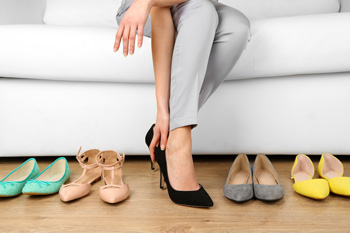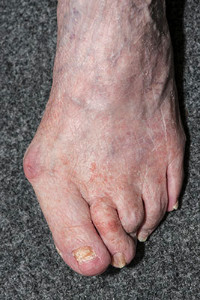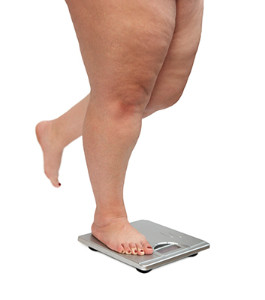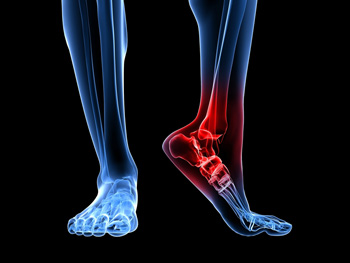Items filtered by date: November 2017
Health Conditions Associated with High Heels
 For some years now, podiatrists have found a link between high heels and foot-related ailments. In addition to the bad effects they produce on the back and legs, high heels also cause a number of health conditions in the feet. Plantar fasciitis, or pain in the heel caused by the inflammation of the plantar fascia, is a common condition caused by high heels. High heels can also make trips and falls more likely, which can result in ankle sprains and other injuries. Due to their design and construction, high heels often force the feet to be squeezed; this pressure has been linked to causing varicose veins. Worsening cases of both hammertoe and turf toe have also been linked to high heels as well. If you do decide to wear high heels, try to wear them for short periods of time and only for special occasions.
For some years now, podiatrists have found a link between high heels and foot-related ailments. In addition to the bad effects they produce on the back and legs, high heels also cause a number of health conditions in the feet. Plantar fasciitis, or pain in the heel caused by the inflammation of the plantar fascia, is a common condition caused by high heels. High heels can also make trips and falls more likely, which can result in ankle sprains and other injuries. Due to their design and construction, high heels often force the feet to be squeezed; this pressure has been linked to causing varicose veins. Worsening cases of both hammertoe and turf toe have also been linked to high heels as well. If you do decide to wear high heels, try to wear them for short periods of time and only for special occasions.
High heels have a history of causing foot and ankle problems. If you have any concerns about your feet or ankles, contact one of our podiatrists from Dr. Kane & Associates, P.C. Our doctors can provide the care you need to keep you pain-free and on your feet.
Effects of High Heels on the Feet
High heels are popular shoes among women because of their many styles and societal appeal. Despite this, high heels can still cause many health problems if worn too frequently.
Which Parts of My Body Will Be Affected by High Heels?
- Ankle Joints
- Achilles Tendon – May shorten and stiffen with prolonged wear
- Balls of the Feet
- Knees – Heels cause the knees to bend constantly, creating stress on them
- Back – They decrease the spine’s ability to absorb shock, which may lead to back pain. The vertebrae of the lower back may compress.
What Kinds of Foot Problems Can Develop from Wearing High Heels?
- Corns
- Calluses
- Hammertoe
- Bunions
- Morton’s Neuroma
- Plantar Fasciitis
How Can I Still Wear High Heels and Maintain Foot Health?
If you want to wear high heeled shoes, make sure that you are not wearing them every day, as this will help prevent long term physical problems. Try wearing thicker heels as opposed to stilettos to distribute weight more evenly across the feet. Always make sure you are wearing the proper shoes for the right occasion, such as sneakers for exercising. If you walk to work, try carrying your heels with you and changing into them once you arrive at work. Adding inserts to your heels can help cushion your feet and absorb shock. Full foot inserts or metatarsal pads are available.
If you have any questions please feel free to contact our office located in Westland, MI.. We offer the newest diagnostic and treatment technologies for all your foot and ankle needs.
Read more about Effect of High Heels on the FeetHealth Conditions Associated with High Heels
 For some years now, podiatrists have found a link between high heels and foot-related ailments. In addition to the bad effects they produce on the back and legs, high heels also cause a number of health conditions in the feet. Plantar fasciitis, or pain in the heel caused by the inflammation of the plantar fascia, is a common condition caused by high heels. High heels can also make trips and falls more likely, which can result in ankle sprains and other injuries. Due to their design and construction, high heels often force the feet to be squeezed; this pressure has been linked to causing varicose veins. Worsening cases of both hammertoe and turf toe have also been linked to high heels as well. If you do decide to wear high heels, try to wear them for short periods of time and only for special occasions.
For some years now, podiatrists have found a link between high heels and foot-related ailments. In addition to the bad effects they produce on the back and legs, high heels also cause a number of health conditions in the feet. Plantar fasciitis, or pain in the heel caused by the inflammation of the plantar fascia, is a common condition caused by high heels. High heels can also make trips and falls more likely, which can result in ankle sprains and other injuries. Due to their design and construction, high heels often force the feet to be squeezed; this pressure has been linked to causing varicose veins. Worsening cases of both hammertoe and turf toe have also been linked to high heels as well. If you do decide to wear high heels, try to wear them for short periods of time and only for special occasions.
High heels have a history of causing foot and ankle problems. If you have any concerns about your feet or ankles, contact one of our podiatrists from Westland Foot & Ankle Specialists, P.C.. Our doctors can provide the care you need to keep you pain-free and on your feet.
Effects of High Heels on the Feet
High heels are popular shoes among women because of their many styles and societal appeal. Despite this, high heels can still cause many health problems if worn too frequently.
Which Parts of My Body Will Be Affected by High Heels?
- Ankle Joints
- Achilles Tendon – May shorten and stiffen with prolonged wear
- Balls of the Feet
- Knees – Heels cause the knees to bend constantly, creating stress on them
- Back – They decrease the spine’s ability to absorb shock, which may lead to back pain. The vertebrae of the lower back may compress.
What Kinds of Foot Problems Can Develop from Wearing High Heels?
- Corns
- Calluses
- Hammertoe
- Bunions
- Morton’s Neuroma
- Plantar Fasciitis
How Can I Still Wear High Heels and Maintain Foot Health?
If you want to wear high heeled shoes, make sure that you are not wearing them every day, as this will help prevent long term physical problems. Try wearing thicker heels as opposed to stilettos to distribute weight more evenly across the feet. Always make sure you are wearing the proper shoes for the right occasion, such as sneakers for exercising. If you walk to work, try carrying your heels with you and changing into them once you arrive at work. Adding inserts to your heels can help cushion your feet and absorb shock. Full foot inserts or metatarsal pads are available.
If you have any questions please feel free to contact our office located in Westland, MI. . We offer the newest diagnostic and treatment technologies for all your foot and ankle needs.
Why Bunions Worsen
 While the exact cause of bunions is unknown, there are things that can exacerbate them. These may include improper footwear, such as pointed shoes, high heels, and shoes that are too narrow across the bottom of the toes. Since the toe typically bears most of the body’s weight, poor footwear can lead to increased wear and tear; this can increase the severity of bunions. Additionally, genetics may play a role because foot structure and shape are hereditary. It’s also common for bunions to become more pronounced for those whose occupations consist of standing or walking. Treatments can include adding padding in the shoes for protection, wearing a shoe with a flexible sole for support, and possibly stretching your shoes to make room for the bunion. If you think you have a bunion, it is recommended to consult a podiatrist for a proper evaluation.
While the exact cause of bunions is unknown, there are things that can exacerbate them. These may include improper footwear, such as pointed shoes, high heels, and shoes that are too narrow across the bottom of the toes. Since the toe typically bears most of the body’s weight, poor footwear can lead to increased wear and tear; this can increase the severity of bunions. Additionally, genetics may play a role because foot structure and shape are hereditary. It’s also common for bunions to become more pronounced for those whose occupations consist of standing or walking. Treatments can include adding padding in the shoes for protection, wearing a shoe with a flexible sole for support, and possibly stretching your shoes to make room for the bunion. If you think you have a bunion, it is recommended to consult a podiatrist for a proper evaluation.
If you are suffering from bunions, contact one of our podiatrists of Dr. Kane & Associates, P.C. Our doctors can provide the care you need to keep you pain-free and on your feet.
What Is a Bunion?
A bunion is formed of swollen tissue or an enlargement of boney growth, usually located at the base joint of the toe that connects to the foot. The swelling occurs due to the bones in the big toe shifting inward, which impacts the other toes of the foot. This causes the area around the base of the big toe to become inflamed and painful.
Why Do Bunions Form?
Genetics – Susceptibility to bunions are often hereditary
Stress on the feet – Poorly fitted and uncomfortable footwear that places stress on feet, such as heels, can worsen existing bunions
How Are Bunions Diagnosed?
Doctors often perform two tests – blood tests and x-rays – when trying to diagnose bunions, especially in the early stages of development. Blood tests help determine if the foot pain is being caused by something else, such as arthritis, while x-rays provide a clear picture of your bone structure to your doctor.
How Are Bunions Treated?
- Refrain from wearing heels or similar shoes that cause discomfort
- Select wider shoes that can provide more comfort and reduce pain
- Anti-inflammatory and pain management drugs
- Orthotics or foot inserts
- Surgery
If you have any questions, please feel free to contact our office located in Westland, MI.. We offer the newest diagnostic and treatment technologies for all your foot care needs.
Read more about BunionsWhy Bunions Worsen
 While the exact cause of bunions is unknown, there are things that can exacerbate them. These may include improper footwear, such as pointed shoes, high heels, and shoes that are too narrow across the bottom of the toes. Since the toe typically bears most of the body’s weight, poor footwear can lead to increased wear and tear; this can increase the severity of bunions. Additionally, genetics may play a role because foot structure and shape are hereditary. It’s also common for bunions to become more pronounced for those whose occupations consist of standing or walking. Treatments can include adding padding in the shoes for protection, wearing a shoe with a flexible sole for support, and possibly stretching your shoes to make room for the bunion. If you think you have a bunion, it is recommended to consult a podiatrist for a proper evaluation.
While the exact cause of bunions is unknown, there are things that can exacerbate them. These may include improper footwear, such as pointed shoes, high heels, and shoes that are too narrow across the bottom of the toes. Since the toe typically bears most of the body’s weight, poor footwear can lead to increased wear and tear; this can increase the severity of bunions. Additionally, genetics may play a role because foot structure and shape are hereditary. It’s also common for bunions to become more pronounced for those whose occupations consist of standing or walking. Treatments can include adding padding in the shoes for protection, wearing a shoe with a flexible sole for support, and possibly stretching your shoes to make room for the bunion. If you think you have a bunion, it is recommended to consult a podiatrist for a proper evaluation.
If you are suffering from bunions, contact one of our podiatrists of Westland Foot & Ankle Specialists, P.C.. Our doctors can provide the care you need to keep you pain-free and on your feet.
What Is a Bunion?
A bunion is formed of swollen tissue or an enlargement of boney growth, usually located at the base joint of the toe that connects to the foot. The swelling occurs due to the bones in the big toe shifting inward, which impacts the other toes of the foot. This causes the area around the base of the big toe to become inflamed and painful.
Why Do Bunions Form?
Genetics – Susceptibility to bunions are often hereditary
Stress on the feet – Poorly fitted and uncomfortable footwear that places stress on feet, such as heels, can worsen existing bunions
How Are Bunions Diagnosed?
Doctors often perform two tests – blood tests and x-rays – when trying to diagnose bunions, especially in the early stages of development. Blood tests help determine if the foot pain is being caused by something else, such as arthritis, while x-rays provide a clear picture of your bone structure to your doctor.
How Are Bunions Treated?
- Refrain from wearing heels or similar shoes that cause discomfort
- Select wider shoes that can provide more comfort and reduce pain
- Anti-inflammatory and pain management drugs
- Orthotics or foot inserts
- Surgery
If you have any questions, please feel free to contact our office located in Westland, MI. . We offer the newest diagnostic and treatment technologies for all your foot care needs.
What Heel Pain Can Tell You
There are several ways to experience heel pain. The heel can be tender, may hurt upon waking up in the morning, or may possibly have a burning sensation. A few common causes of this type of pain include being overweight, standing for long periods of time, and running for exercise. One diagnosis may be plantar fasciitis, which may make it difficult to be on your feet all day. Resting the feet and applying an ice pack may aid in the reduction of pain. Stretching the foot on a daily basis is also an effective form of pain relief. Another way of treating heel pain is to consult a podiatrist and see if you need to be fitted for orthotics. The chances of recovery are generally good when using a combination of these heel pain therapies.
Many people suffer from bouts of heel pain. For more information, contact one of our podiatrists of Westland Foot & Ankle Specialists, P.C.. Our doctors can provide the care you need to keep you pain-free and on your feet.
Causes of Heel Pain
Heel pain is often associated with plantar fasciitis. The plantar fascia is a band of tissues that extends along the bottom of the foot. A rip or tear in this ligament can cause inflammation of the tissue.
Achilles tendonitis is another cause of heel pain. Inflammation of the Achilles tendon will cause pain from fractures and muscle tearing. Lack of flexibility is also another symptom.
Heel spurs are another cause of pain. When the tissues of the plantar fascia undergo a great deal of stress, it can lead to ligament separation from the heel bone, causing heel spurs.
Why Might Heel Pain Occur?
- Wearing ill-fitting shoes
- Wearing non-supportive shoes
- Weight change
- Excessive running
Treatments
Heel pain should be treated as soon as possible for immediate results. Keeping your feet in a stress-free environment will help. If you suffer from Achilles tendonitis or plantar fasciitis, applying ice will reduce the swelling. Stretching before an exercise like running will help the muscles. Using all these tips will help make heel pain a condition of the past.
If you have any questions please contact our office located in Westland, MI. . We offer the newest diagnostic and treatment technologies for all your foot and ankle needs.
What Heel Pain Can Tell You
There are several ways to experience heel pain. The heel can be tender, may hurt upon waking up in the morning, or may possibly have a burning sensation. A few common causes of this type of pain include being overweight, standing for long periods of time, and running for exercise. One diagnosis may be plantar fasciitis, which may make it difficult to be on your feet all day. Resting the feet and applying an ice pack may aid in the reduction of pain. Stretching the foot on a daily basis is also an effective form of pain relief. Another way of treating heel pain is to consult a podiatrist and see if you need to be fitted for orthotics. The chances of recovery are generally good when using a combination of these heel pain therapies.
Many people suffer from bouts of heel pain. For more information, contact one of our podiatrists of Dr. Kane & Associates, P.C. Our doctors can provide the care you need to keep you pain-free and on your feet.
Causes of Heel Pain
Heel pain is often associated with plantar fasciitis. The plantar fascia is a band of tissues that extends along the bottom of the foot. A rip or tear in this ligament can cause inflammation of the tissue.
Achilles tendonitis is another cause of heel pain. Inflammation of the Achilles tendon will cause pain from fractures and muscle tearing. Lack of flexibility is also another symptom.
Heel spurs are another cause of pain. When the tissues of the plantar fascia undergo a great deal of stress, it can lead to ligament separation from the heel bone, causing heel spurs.
Why Might Heel Pain Occur?
- Wearing ill-fitting shoes
- Wearing non-supportive shoes
- Weight change
- Excessive running
Treatments
Heel pain should be treated as soon as possible for immediate results. Keeping your feet in a stress-free environment will help. If you suffer from Achilles tendonitis or plantar fasciitis, applying ice will reduce the swelling. Stretching before an exercise like running will help the muscles. Using all these tips will help make heel pain a condition of the past.
If you have any questions please contact our office located in Westland, MI.. We offer the newest diagnostic and treatment technologies for all your foot and ankle needs.
Read more about Heel PainFoot Conditions and Obesity
 Experiencing pain and swelling in the feet are some of the biggest side effects of being obese. These symptoms occur because the body tries to move differently to compensate for the added weight. Being overweight as an adult can result in type 2 diabetes. Diabetes can be a serious condition for many reasons, one of which is neuropathy. This disease can cause feeling to be lost in the feet and legs. Being overweight may also lead to sores on the feet, which may not properly heal. Plantar fasciitis and foot pain can also occur since more pressure is put on the joints, ligaments, tendons, and muscles from being overweight. Special footwear and orthotics may help to keep the feet properly aligned and supported. Make sure to see a podiatrist if you believe you are having any type of foot or ankle issue.
Experiencing pain and swelling in the feet are some of the biggest side effects of being obese. These symptoms occur because the body tries to move differently to compensate for the added weight. Being overweight as an adult can result in type 2 diabetes. Diabetes can be a serious condition for many reasons, one of which is neuropathy. This disease can cause feeling to be lost in the feet and legs. Being overweight may also lead to sores on the feet, which may not properly heal. Plantar fasciitis and foot pain can also occur since more pressure is put on the joints, ligaments, tendons, and muscles from being overweight. Special footwear and orthotics may help to keep the feet properly aligned and supported. Make sure to see a podiatrist if you believe you are having any type of foot or ankle issue.
Obesity has become very problematic at this point in time and can have extremely negative effects on the feet. If you’re an obese individual and are concerned about your feet, contact one of our podiatrists from Westland Foot & Ankle Specialists, P.C.. Our doctors can provide the care you need to keep you pain-free and on your feet.
Obesity and Your Feet
Since your feet are what support your entire weight when standing, any additional weight can result in pain and swelling. Being overweight is one of the main contributors to foot complications.
Problems & Complications
Extra Weight – Even putting on just a few extra pounds could create serious complications for your feet. As your weight increases, your balance and body will shift, creating new stresses on your feet. This uneven weight distribution can cause pain, even while doing the simplest tasks, such as walking.
Diabetes – People who are overweight are at serious risk of developing type-2 diabetes, which has a drastic impact on the health of your feet. As you get older, your diabetes might worsen, which could lead to loss of feeling in your feet, sores, and bruises. You could also become more prone to various infections.
Plantar fasciitis – Pressure and stress that is placed on muscles, joints, and tendons can trigger plantar fasciitis, which is an inflammation of tissue that forms along the bottom of the foot.
If you have any questions please feel free to contact our office located in Westland, MI. . We offer the newest diagnostic and treatment technologies for all your foot and ankle needs.
Foot Conditions and Obesity
 Experiencing pain and swelling in the feet are some of the biggest side effects of being obese. These symptoms occur because the body tries to move differently to compensate for the added weight. Being overweight as an adult can result in type 2 diabetes. Diabetes can be a serious condition for many reasons, one of which is neuropathy. This disease can cause feeling to be lost in the feet and legs. Being overweight may also lead to sores on the feet, which may not properly heal. Plantar fasciitis and foot pain can also occur since more pressure is put on the joints, ligaments, tendons, and muscles from being overweight. Special footwear and orthotics may help to keep the feet properly aligned and supported. Make sure to see a podiatrist if you believe you are having any type of foot or ankle issue.
Experiencing pain and swelling in the feet are some of the biggest side effects of being obese. These symptoms occur because the body tries to move differently to compensate for the added weight. Being overweight as an adult can result in type 2 diabetes. Diabetes can be a serious condition for many reasons, one of which is neuropathy. This disease can cause feeling to be lost in the feet and legs. Being overweight may also lead to sores on the feet, which may not properly heal. Plantar fasciitis and foot pain can also occur since more pressure is put on the joints, ligaments, tendons, and muscles from being overweight. Special footwear and orthotics may help to keep the feet properly aligned and supported. Make sure to see a podiatrist if you believe you are having any type of foot or ankle issue.
Obesity has become very problematic at this point in time and can have extremely negative effects on the feet. If you’re an obese individual and are concerned about your feet, contact one of our podiatrists from Dr. Kane & Associates, P.C. Our doctors can provide the care you need to keep you pain-free and on your feet.
Obesity and Your Feet
Since your feet are what support your entire weight when standing, any additional weight can result in pain and swelling. Being overweight is one of the main contributors to foot complications.
Problems & Complications
Extra Weight – Even putting on just a few extra pounds could create serious complications for your feet. As your weight increases, your balance and body will shift, creating new stresses on your feet. This uneven weight distribution can cause pain, even while doing the simplest tasks, such as walking.
Diabetes – People who are overweight are at serious risk of developing type-2 diabetes, which has a drastic impact on the health of your feet. As you get older, your diabetes might worsen, which could lead to loss of feeling in your feet, sores, and bruises. You could also become more prone to various infections.
Plantar fasciitis – Pressure and stress that is placed on muscles, joints, and tendons can trigger plantar fasciitis, which is an inflammation of tissue that forms along the bottom of the foot.
If you have any questions please feel free to contact our office located in Westland, MI.. We offer the newest diagnostic and treatment technologies for all your foot and ankle needs.
Read more about How Obesity Affects Your Feet

